Your parrots require a balanced diet and adequate sleep to stay healthy. However, there are instances when a parrot may exhibit changes in its eating and sleeping patterns, causing concern for its owners. But why do parrots display such behavior?
Parrots might stop eating and overseeing due to illness or a change in environment. Hormonal changes and nutritional deficiencies can also be the reasons. In some cases, psychological or dental problems are the culprit.
Let’s explore eight different reasons why a parrot may not be eating and sleeping a lot. We will also discuss the treatment options to address these issues.
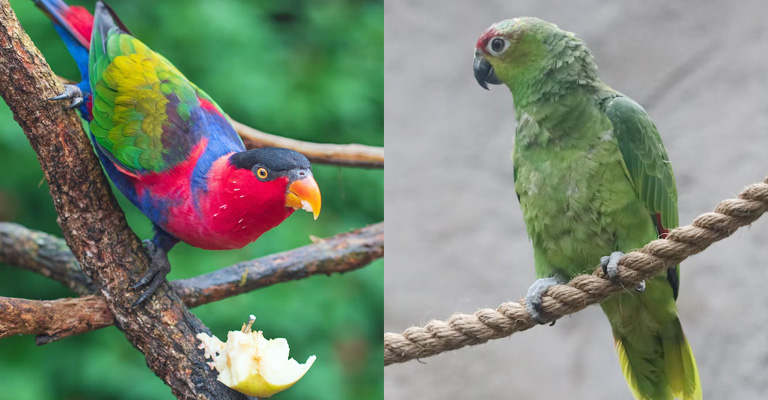
Why Is Your Parrot Not Eating and Sleeping A Lot?
If your parrot is not eating and sleeping a lot, it could be an indication of an underlying health issue. It’s important to consult with a veterinarian who specializes in avian care for a proper diagnosis and treatment plan.
Here are a few potential reasons and treatments that you should consider:
Illness or Pain
One of the primary reasons for a parrot’s decreased appetite and increased sleep could be an underlying illness or pain. Parrots may exhibit these symptoms when they are unwell, and it is crucial to seek veterinary attention to diagnose and treat any potential health issues.
Environmental Changes
Parrots are sensitive to their surroundings, and significant changes in their environment can disrupt their eating and sleeping patterns.
Moving to a new home, changes in cage placement, or the presence of loud noises or new pets can cause stress, leading to decreased appetite and increased sleep.
Nutritional Deficiencies
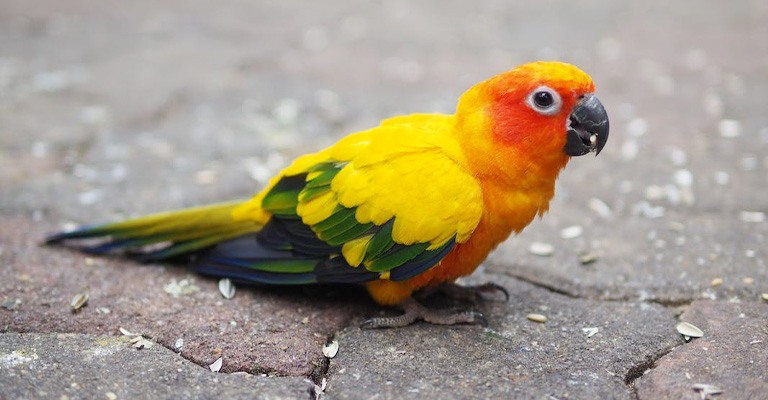
Improper diet or nutritional deficiencies can also contribute to a parrot’s lack of appetite. If a parrot’s diet lacks essential nutrients, it may result in reduced interest in food.
Ensuring a balanced diet that includes a variety of fresh fruits, vegetables, grains, and a high-quality pellet mix is essential for their well-being.
Hormonal Changes
Parrots go through hormonal changes, especially during breeding seasons. These hormonal shifts can affect their appetite and sleep patterns.
Owners should be aware of these natural changes and provide appropriate care, such as a suitable nesting area, to support their parrot during this period.
Psychological Distress
As parrots are highly social creatures, they require mental stimulation and social interaction to thrive. Loneliness, boredom, or lack of mental engagement can lead to stress and a decline in appetite, and excessive sleep. Providing toys, regular interaction, and opportunities for playtime can help alleviate these issues.
Dental or Beak Problems
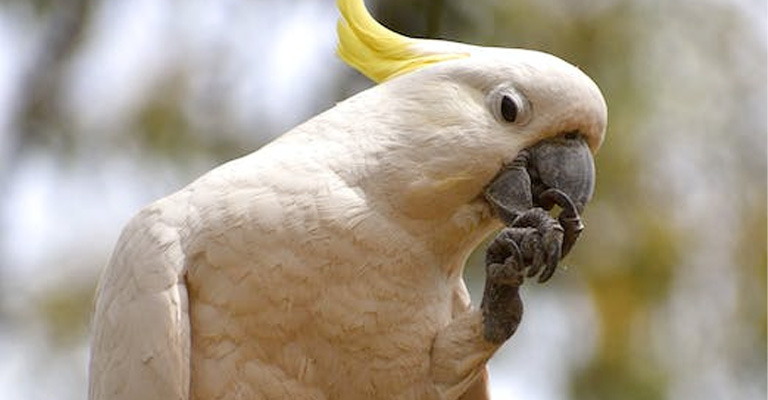
If your parrot has dental or beak problems, it can make eating uncomfortable for parrots, leading to a reduced appetite. Overgrown beaks, infections, or damaged teeth can cause pain and difficulty in chewing food. Regular veterinary check-ups and providing suitable chew toys can help prevent such problems.
Parasites or Infections
Too often, parasites or infections, such as gastrointestinal worms or respiratory infections, can affect a parrot’s overall health and appetite. Veterinary examination and appropriate treatment are necessary to address these issues.
Age-related Changes
As parrots age, they may experience a decrease in appetite and sleep more than usual. These changes are part of the natural aging process, and owners should ensure that their parrot receives a suitable diet and comfortable sleeping arrangement.
How to Treat If My Parrot is Not Eating and Sleeping a Lot
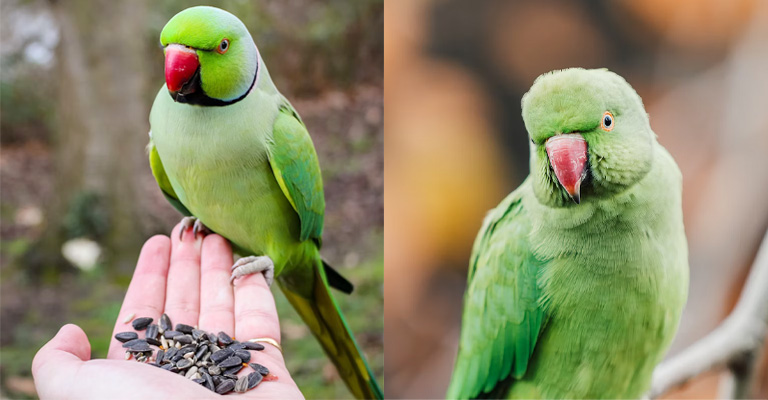
Just like any other birds, parrots also need a daily healthy diet to survive. If your parrot has stopped eating, you must take action immediately. Here’s what you can do-
Veterinary Consultation
If you notice persistent changes in your parrot’s eating and sleeping patterns, it is crucial to consult an avian veterinarian. They can conduct a thorough examination to identify any underlying health issues and provide appropriate treatment.
Balanced Diet
Ensure that your parrot’s diet is nutritionally balanced and includes a variety of fresh fruits, vegetables, and high-quality pellets. Consult with an avian veterinarian or a qualified avian nutritionist to design a suitable diet plan.
Environmental Enrichment
Provide a stimulating environment for your parrot, including toys, puzzles, and regular interaction. This can alleviate boredom and encourage healthy eating habits.
Address Stress Factors
Identify and address any potential stressors in your parrot’s environment. Create a calm and secure living space by minimizing loud noises, maintaining a consistent routine, and providing a comfortable and secure cage.
Regular Veterinary Check-ups
Schedule regular check-ups with an avian veterinarian to monitor your parrot’s health and address any emerging issues promptly.
Medication and Treatments
Depending on the underlying cause, your veterinarian may prescribe medication or treatments to address specific health conditions. Follow their guidance closely and administer any prescribed medications as directed.
Nutritional Supplements
In some cases, nutritional supplements may be recommended to address deficiencies and improve appetite. Consult with your veterinarian to determine the appropriate supplements for your parrot.
Behavior Modification
If your parrot’s eating and sleeping patterns are due to behavioral issues, such as anxiety or boredom, consult with an avian behavior specialist to develop a behavior modification plan. This may involve training exercises, socialization techniques, or environmental changes.
How to Prevent Parrots from Oversleeping?
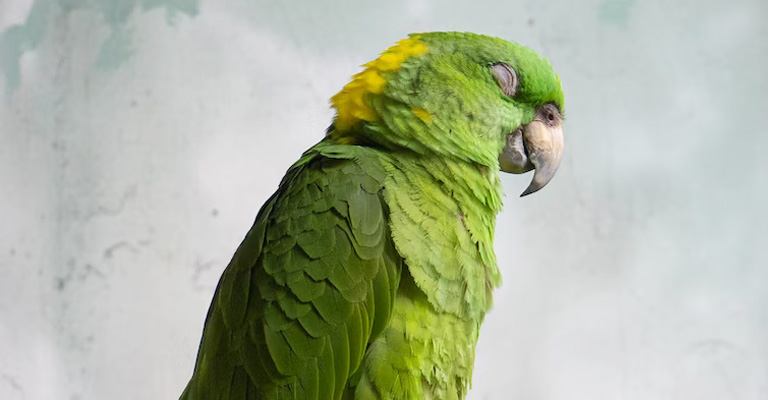
Oversleeping can lead to a decrease in physical activity, social interaction, and mental stimulation, which are vital for a parrot’s overall health. It may also result in weight gain, as decreased activity can contribute to a sedentary lifestyle.
So, to prevent oversleeping in parrots, try these measures:
Provide Adequate Stimulation
Parrots need mental stimulation to stay active and engaged. Offer them a variety of toys, puzzles, and foraging opportunities to keep them mentally stimulated throughout the day. Rotate the toys regularly to prevent boredom.
Maintain a Consistent Routine
Establish a consistent daily routine for your parrot. Set regular times for waking up, feeding, playtime, training, and bedtime. Having a predictable routine helps regulate their sleep patterns and prevents oversleeping.
Provide Natural Light
Exposure to natural light is crucial for a parrot’s overall well-being. Ensure that your parrot’s cage is placed in an area with access to natural daylight. The natural light helps regulate their internal clock and encourages them to stay awake during the day.
Social Interaction
Parrots are highly social creatures that thrive on social interaction. Spend quality time with your parrot, engage in interactive play, and provide regular companionship. This social interaction helps keep them active and prevents excessive sleep.
Proper Temperature
Parrots are sensitive to temperature extremes. Ensure that their environment is kept at a comfortable temperature range, usually between 65°F to 80°F (18°C to 27°C). Extreme heat or cold can make parrots lethargic and prone to oversleeping.
Regular Exercise
Regular exercise is essential for a parrot’s physical and mental well-being. Provide opportunities for your parrot to fly or exercise their wings outside of their cage in a safe and supervised environment. Physical activity helps prevent oversleeping and promotes a healthy sleep-wake cycle.
Monitor Sleep Duration
Keep an eye on your parrot’s sleep duration. While parrots require an adequate amount of sleep, excessive sleeping can be a sign of health issues or boredom. Consult with an avian veterinarian if you notice any significant changes in your parrot’s sleep patterns.
FAQs
Sudden changes in appetite can be caused by various factors, including illness, stress, or environmental changes. Consulting with a veterinarian is recommended to determine the underlying cause.
It is not advisable to feed your parrot human food as it may lack essential nutrients and may not be suitable for their digestive system. Consult with a veterinarian to find alternative solutions.
Parrots are diurnal creatures, meaning they are naturally active during the day. If your parrot has reversed sleep patterns, it is essential to assess their environment and ensure adequate stimulation during the day to encourage daytime activity.
Consult with a veterinarian to determine the underlying cause of weight loss. They may recommend dietary adjustments, nutritional supplements, or specific treatments to address the issue.
Regular veterinary check-ups, providing appropriate chew toys, and ensuring a balanced diet that includes foods that promote healthy beak and dental health can help prevent these issues.
Final Words
So, now you know what causes the parrot not to eat and sleep a lot issue. Changes in a parrot’s eating and sleeping patterns can be a cause for concern, indicating underlying health or environmental issues. It is important to address these changes promptly to ensure the well-being of your feathered friend.
By understanding the potential reasons behind their altered behavior, seeking veterinary guidance, providing a balanced diet, environmental enrichment, and maintaining a consistent routine, you can help your parrot regain its appetite, improve its sleep patterns, and lead a healthy, happy life.